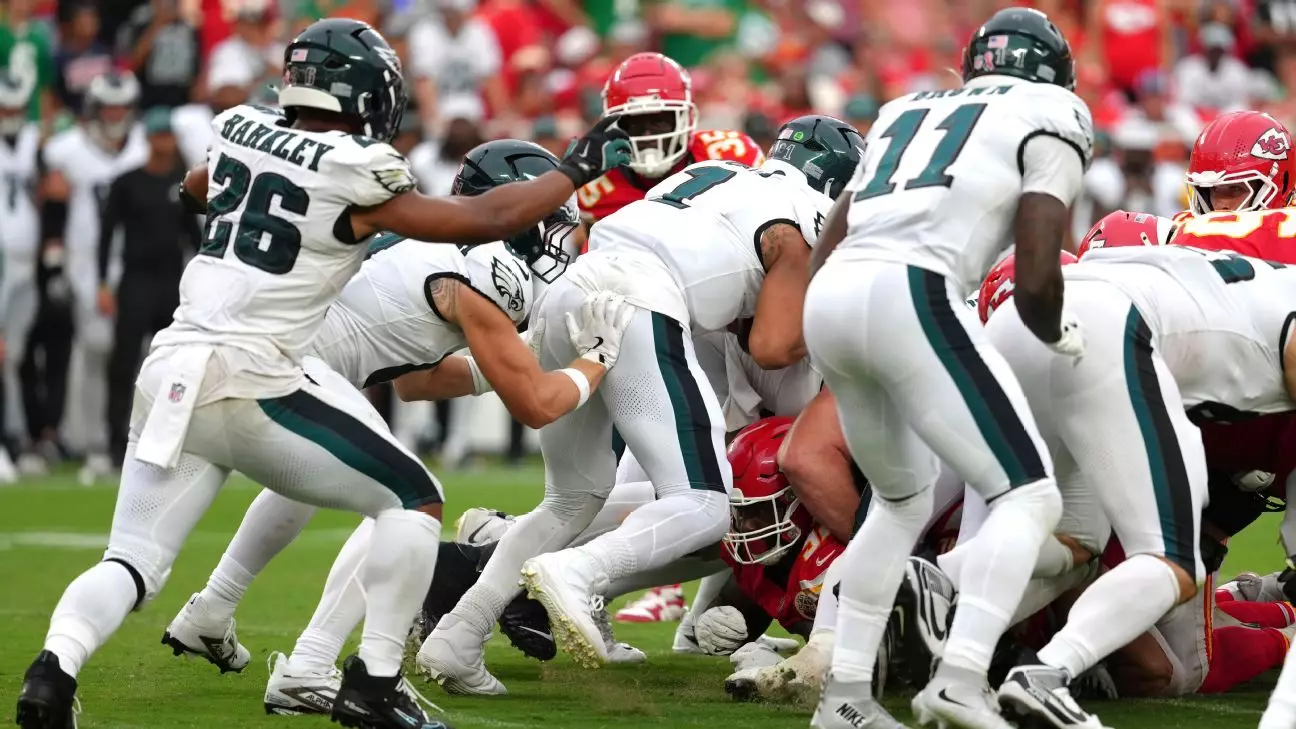The recent decision by the NFL to crack down on the Philadelphia Eagles’ use of the so-called “tush push” exposes a troubling inconsistency in how the league enforces its rules. While originally considering banning the play—arguably one of the most effective short-yardage tactics—the NFL seemed reluctant, and ultimately unsuccessful, in its effort to suppress its use. Now, with explicit instructions to officials to call the play “tight,” the league demonstrates a lack of clear, fair standards, favoring subjective interpretation over transparent rules. This inconsistency damages the integrity of the game, cultivating an environment of arbitrary officiating rather than structured fairness.
The NFL’s approach highlights a deeper issue: the selective application of rules based on the perceived sportsmanship or popularity of the play. It’s evident that the league’s officials are being pressured to scrutinize and penalize this strategy more aggressively, even when the offensive line meticulously follows the rules. The play itself involves quick, synchronized movements that, with proper technique, are perfectly legal. Accusations of early movement or offsides often boil down to subjective judgment calls, likely influenced by the play’s controversy and the Eagles’ success with it.
Such inconsistent enforcement fosters frustration among teams and fans alike. When rules are enforced unevenly, it shakes fans’ trust in the fairness of the competition. This selective policing does more harm than good, creating an impression that the league is more interested in controlling the spectacle than ensuring a level playing field. The NFL must recognize that fairness isn’t achieved through heightened scrutiny of specific plays but through consistent application of rules governing all teams equally.
Political Motives and the Erosion of Competitive Integrity
The NFL’s actions reveal an underlying tendency toward managerial overreach that undermines competitive integrity. Instead of embracing the play as part of the game’s strategic evolution, officials and league leaders seem eager to restrict it. This decision is compounded by the political pressure from teams and analysts who claim the play is “unsportsmanlike” or “unfair.” But what’s truly unfair is unequitable enforcement and the manipulation of rules to favor traditional or less innovative strategies.
The push to ban or heavily scrutinize the tush push is reminiscent of broader tendencies within professional sports to police innovation—sometimes at the expense of strategic creativity. It raises questions about whether the league’s decisions are driven by genuine safety concerns, or by a desire to maintain the status quo, marginalizing effective tactics that challenge conventional gameplay. The Eagles’ success with this play, with a near-perfect conversion rate since 2022, underscores how the play is a legitimate component of strategic football, not a rule-breaking anomaly.
From a liberal centrist perspective, this situation underscores the importance of a balanced, rules-based approach that respects the game’s evolution while safeguarding fairness. When the NFL arbitrarily targets specific plays or teams, it risks alienating fans who value the sport’s strategic diversity. The league’s failure to definitively regulate the tush push through proper rule amendments—after the proposal to ban it fell short—reveals a reluctance to confront the real issues with transparent leadership.
Impact on Player Safety and Game Strategy
Some defenders argue that strict officiating of short-yardage plays like the tush push is necessary for player safety. However, this perspective often slips into moral panic rather than evidence-based reasoning. The play itself, when properly executed, should not pose unusual risks; instead, it requires precise coordination and technique. The insistence on cracking down might inadvertently force offensive lines into more precarious positions or encourage riskier plays that compromise safety.
Furthermore, the entire debate shifts the focus away from genuine gameplay and into the realm of regulation. What is perhaps most troubling is how the obsessive policing of a single play distorts the strategic diversity of football. Teams are encouraged to abandon innovative tactics that could enhance the game’s excitement in favor of adhering to a vague, inconsistently enforced rule set. This stifling of tactical evolution ultimately damages the sport’s appeal, especially among younger audiences who crave creative, unpredictable competition.
In the end, the league’s reactive stance undermines not just the fairness of calls but also the very spirit of football—strategic ingenuity rooted in fair competition. If the NFL truly cares about safety and fairness, it must revisit its approach to evolving plays like the tush push, adopting transparent rules that respect players’ skills and strategic choices rather than subjectively policing the game based on shifting standards.

